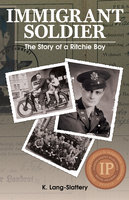|
Rating:
Author: Kathryn Lang-Slattery
Publisher: Pacific Bookworks Published: 2015-02-26 ISBN(s) 978-0-9906742-2-1 Editor: Lorraine Fico-White Illustrator: Cole Waidley Language(s): English Category: Fiction Audience: Adult, Youth (13 to 17) Genre(s): Historical Fiction, War, Action Read Excerpt > The quiet of the early November morning was shattered by the screech of brakes and loud voices. Herman peered through the crack in the stable door. A prickle of fear shot up his neck at the sight of a covered truck, two police motorcycles, and a black sedan in front of the homes across the street. Two brown-shirted SA officers, the Swastika symbols on their armbands blazing, pounded on his cousin’s front door. Hatred rose in his throat. Nazi Storm Troopers—they were nothing more than thugs, bullies for Hitler and his political party. Two more men in ugly, brown uniforms beat at the door of the neighbor’s home where Herman rented a room from the horse dealer and his wife. The faces of the SA men contorted with anger and their words polluted the air. “Achtung! Alles’raus! Attention! Everyone out! Get out, you stupid Jews. Wake up! Schnell! Juden! Alles’raus! Schnell! Fast! Jews! Everyone out! Fast!” The thud of Herman’s heart was palpable. Pain seized his gut. The door of his landlord’s home opened a crack. One of the SA men kicked it wide, and the loud smack of his boot against the wood sent a chill down Herman’s spine. As the Nazis pushed into the house, he heard the confused sounds of loud voices and smashing furniture. An image of the horse-dealer’s wife, beautiful Frau Mannheimer, exploded in his mind, her nightdress ripped, her golden hair gripped in the SA man’s fist. He heard her high-pitched scream leak into the cold morning, and he lurched forward, outside the barn. He was barely through the stable door when a policeman stepped from behind the black truck. His pistol glinted in the gray morning light, and the sight of the weapon shocked Herman like a jolt of electricity. His wild impulse to be a hero evaporated. He ducked behind the wide doors, angry and ashamed, listening to his heart pound. He pressed both hands against his abdomen and took several deep breaths. He shook his head to clear it and again put his eye to the crack between the door and the jamb. The policeman must have heard something because he waved his pistol menacingly. He was poised in a half crouch, as if ready to run, and his gaze swept past the stable, down the street, and back again. Finally he turned and moved toward the open door of the Mannheimers’ home. Herman inched farther back into the shadows and waited. Less than an hour ago, he had walked to his morning job, the feel of the street cobbles solid and familiar under his feet, his breath visible in the cold air. In the stable yard, blades of stubborn, frost-crusted grass pushed through the trampled earth. He had dipped his fingers into the water trough, breaking the thin film of ice that glistened in the dawn light. The black surface of the water mirrored a reflection of his gray eyes, strong chin, and the curl of dark hair that fell over his forehead. He pushed back the loose hair with his wet fingers and entered the barn. The warm odor of straw and manure enveloped him. The powerful draft horses moved in their stalls. The soft stamp of their hooves and the bump of their flanks against the boards comforted him like a morning lullaby. Herman had gone to the tack room to get the curry brush. His motorcycle, which he was allowed to park there, gleamed amid the coils of rope, harnesses, and bridles. He ran his fingers across the shiny black fender, up the rounded shape of the gas tank, and whispered, “Good morning, baby.” For two years he had saved every pfennig, until finally six months ago, as a celebration of his eighteenth birthday, he had gathered his savings and bought the nearly new motorcycle from a local man bound for the army. Riding gave him a sense of freedom he couldn't get from any other part of his life. On his days off work, Herman left the cobbled lanes of Suhl and escaped to the countryside, riding from early morning until the long afternoon shadows bled into dusk. At the crest of a hill he would hesitate, then with a twist of the throttle, speed forward. The sensation when he swooped down the hill lifted his spirits. Sometimes, if the road was straight and flat, he would let go of the handlebars and stretch his arms out on either side like a tightrope walker. The wind pushed against his hands, tugged at his jacket, and battered his face. For a moment, he could imagine he was fleeing this horrible new Germany. On his way home, as day faded into night, the single headlamp dimly illuminated the road ahead. He felt like a man returning to prison. Now he stood in the darkened barn and listened to the muffled sounds that came from outside—the thud of boots, the slam of doors, and shouts of "Raus!'Raus!" Above everything, he heard the heartrending sound of a woman screaming, "Nein, bitte . . . nicht Sie ihn verletzen. Don't hurt him!" He edged forward cautiously and looked outside again. His cousin's wife, Hilda Meyer, normally neat and proper, stood in the street in her night clothes, her robe half on, half off, its belt dangling. Her hair stuck out at odd angles, uncombed and tangled from sleep. She moaned as her husband, still in his pajamas, grasped her shoulder, trying to steady her. He moved one hand to cradle her chin and leaned forward to talk softly into her ear. Cousin Fritz, usually funny and full of stories, was serious now. The words he whispered seemed to calm his wife. Herman could see the movement of shadows in the house doorway, and he knew the two Meyer children huddled there. An impatient SA man clutched his baton and stomped over. He yelled as he prodded Fritz in the ribs with his club. The controlled look on his cousin's face dissolved, and his eyes grew wide with fear. The storm trooper took no notice and shoved his victim toward the truck. The whack of the stick against Fritz's back as he scrambled up into the vehicle was muffled by distance, but the sight made Herman flinch as if he had been struck himself. Two other SA men emerged from his landlord’s door, the horse dealer between them. Herr Mannheimer was shoeless, the long tails of his unbuttoned shirt flapping in the chilly breeze. Blood streamed from a cut over his eye, dripped down his cheek and neck, and soaked into his shirt collar. He seemed dazed, only half conscious, as he clambered into the back of the truck where Fritz grabbed his neighbor to steady him. The horse-dealer’s wife was nowhere to be seen. Herman bit his lip and closed his eyes as he tried to imagine her hidden safely in the cupboard under the stairs, but the picture that surged into his head was of her body sprawled on the entryway floor, an SA man, his club raised, towering over her. He opened his eyes allowing the stark reality of the street to erase the image. The Meyer children had darted out of the doorway, into the street, and clutched at their mother’s thin nightgown. Little Anna buried her face in her mother’s stomach, but Hans stood straight in an effort to be brave. Hilda’s shoulders shook, and she released an audible moan as she encircled the children with her arms. The sudden thought of his own mother, alone in their home in Meiningen, pushed Herman into action. He jerked away from the barn door and lurched into the tack room. With one kick of his boot, he flipped up the stand of his motorcycle, struggled to wheel the heavy machine into the stable, and with a last glance toward the wide doors facing the street, pushed it out the back to the paddock and a little-used dirt alleyway. With a practiced swing of his leg, he mounted and kicked the engine to life. The powerful machine took off with a surge of speed that lifted the front tire as it jumped over the first ruts. Icy wind blew his cap from his head, but he raced on. The frigid air stung his ears and drowned out the sounds that echoed in his head. He forced himself to think only of getting home—fast.
|
Immigrant Soldier ~ The Story of a Ritchie Boy
|
See Bio >
Book 0 of 0 in the Immigrant Soldier Series.
Jewish refugee becomes General Patton's right-hand man.
Part coming-of-age story, part immigrant tale, part World War II adventure, Immigrant Soldier, The Story of a Ritchie Boy, is closely based on a true story. Nineteen year old Herman flees Nazi Germany and comes to California in 1940. As he meets the challenges of his new life, he gradually evolves from a frustrated teen, looking for a place to belong, into a confident and caring US Army intelligence officer. The reader is swept along as the hero experiences fear, romance, loyalty, disappointment, friendship, horror, and compassion in his quest for an understanding of hate and forgiveness.
BWB never takes commissions - Authors! Sign Up Now! Only $9.99
More books by |



